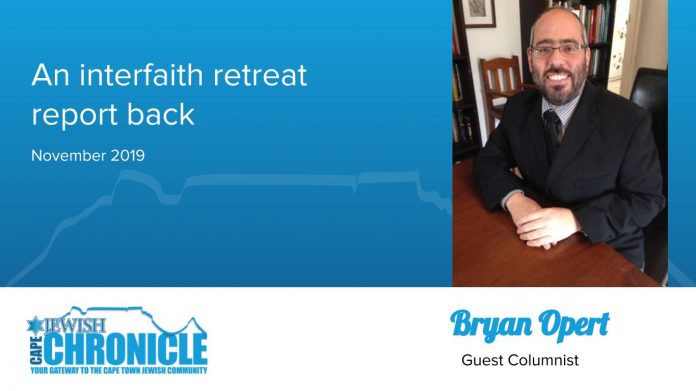An Imam, a Reverend, a Religious Muslim feminist and a Rabbi… sounds like the beginning of a good joke.
However, jokes aside, 20-22 September saw such a real-life retreat take place. Rabbi Sacks in his book The Dignity of Difference convincingly argues that the three Abrahamic religions have much in common making dialogue not only possible but an imperative.
I had reservations concerning my attendance and met with the head of the Open Mosque, who had organised the retreat, Imam Dr Taj Hargey. It was a pleasure to speak with him, his investment in seeing real interaction take place between these three faiths is a passion and perhaps even an obsession of his.
Sometimes one needs to call a spade a shovel, I did feel a need to engage with him around Israel. Acknowledging Natan Sharansky’s three ‘D’, distinguishing criticism of Israel from Anti-Semitism was for me a prerequisite to attendance. In discussions with Dr Hargey it was clear that his ideas had evolved and become aligned with the following approach; in his own words: I believe that the Jewish people have a legitimate right to a nation state in Israel alongside the legitimate rights of the Palestinians.
Together with my eldest son, Netanel we trekked to Greyton. What we found there, was a unique group of approximately 40 people who — and I realise how clichéd this sounds — were bound together in love and hope. The openness was awe-inspiring. It was clear there was no desire to convert, convince or coerce. It was a sharing of ideas by religious leaders of their own faiths view on a number of topics, all focussing on the concept of Justice.
Justice and Gender, Parenting, Minority groups and Justice and Socio-economic issues were some of the topics chewed over at the sessions. I ensured that every session I gave started with the messages, ideas and wisdom from our Holy Torah. I suggested that I was a fundamentalist (which received some titters from the audience) as I used the fundamental texts to inform my thinking. There is, I argued, a substantial difference between a fundamentalist, who uses the foundational Revelation Texts, to extremists who cherry-pick only extreme text to carry out their shameful deeds.
I shared with the group some of the complex ideas, exhorting Jews to love humanity, treating ‘the other’ with dignity and how justice is the perfect balance between consequences and mercy. These ideas are expressed historically from the Talmud to Rabbi Jonathan Saks
At the commencement of the conference Dr Woodman shared with the group what the research revealed about the challenges to interfaith dialogue. One of the points was that often the areas of greatest agreement were focussed on, leaving the ‘real’ issues on the side-lines. I raised issues that had partially moulded the Jewish community’s sense of self for example how the last 2000 years of second-class status in Christian and Muslim countries affected our world view, also concepts that might be difficult for other Faiths like the belief of Chosenness. In an informal, although group setting, Israel as an Apartheid state was mentioned and hotly debated, albeit for only a short time. I then sat with the most vocal critic and we learnt some Quran together!
One of the greatest challenges was what I called the ‘icky’ texts. Everyone is able to quote single statements that deal with justice for women, gentiles or the enemy, that sound ‘icky’. I did not shy away from them and demonstrated how the sages cogently explain that the body of Torah law is a complex and sophisticated structure, no less so, then that of any other. Single quotes out of context are neither helpful nor an intelligent manner of interrogating a system. Additionally, the foundational philosophical structure of the Torah comprises the concept of Divine Imperative and not liberal humanism.
Besides for the specific talks there were a multitude of questions that were asked and answered, additionally the informal discussions were numerous. By the end I was exhausted, but exhilarated and look forward, if Dr Hargey will have me, to join next year.
I believe that within Cape Town, and maybe South Africa this retreat is one of a kind, where authentic learning takes place specifically from speakers who are deeply entrenched and knowledgeable in their Sacred books and tradition.
One of the unique features of the retreat was learning from Dr Elham Manea a most unusual academic. ‘Google’ her and you will be astounded! She is deeply rooted in spirituality, commitment to her Islamic identity with a thorough knowledge of the Islamic teaching. Besides for which…she has a fine sense of humour. The Christian couple the McVeys were embracing, warm, fantastic pedagogues and a pleasure to be with. Professor Dan McVey although a practicing Pastor has degrees in Islamic Studies- an extra-ordinarily interesting individual.
The ethos of respect and inclusiveness allowed for our strict observance of Shabbat, and Kashrut. Not only that, but there was a desire by the participants to share in Jewish experiences. Havdala, specifically, was exceptional — the singing, the spices and the candles spreading the light, was exquisite.
It would have been super to have more of our community attending over and above the eight of us who were there. Besides for the engagement and breaking of barriers and stereotypes, the learning of foundational and cultural concepts of other religions and how they struggle, as we do intra-communally gave a depth that, I believe, is not attainable a in a one-off meeting or day conference.
The retreat was illuminating, light-at some moments, challenging at others, but it was no joke.
To download the November issue of the Chronicle, click here
To read the editor’s column for this month click here
To read the most read story in the October issue, click here











